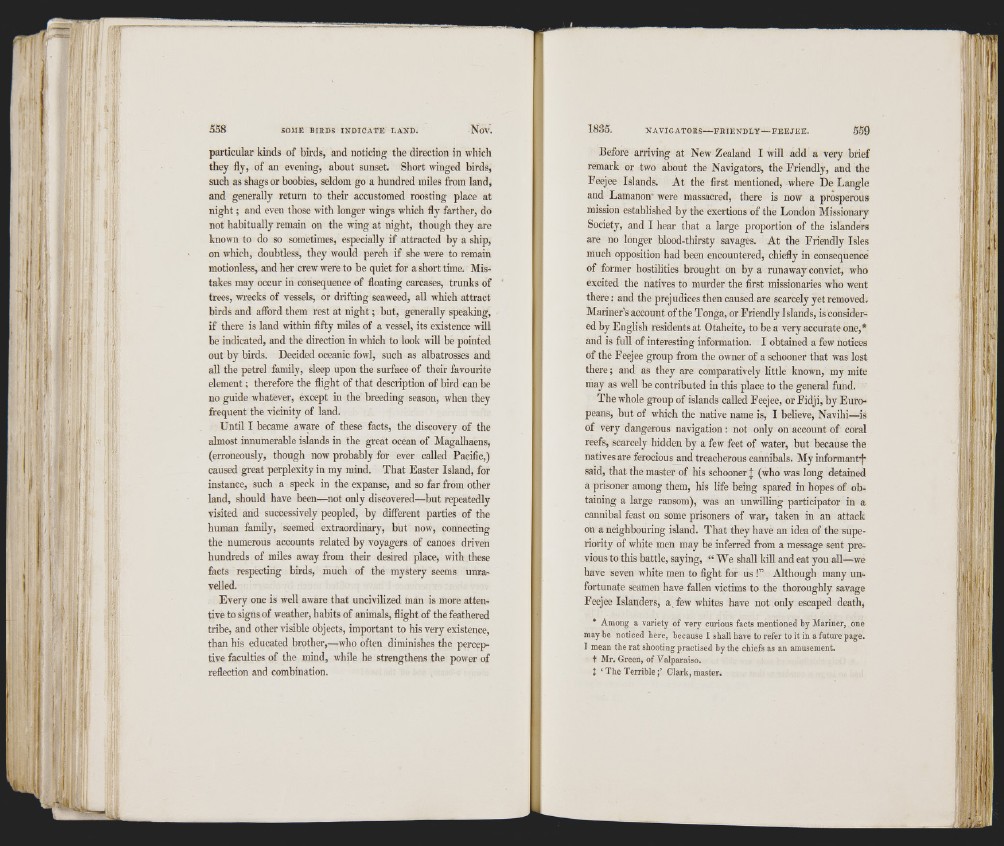
f ¡’
; ï
l i
h:
- n i in
'1 í ! 5 >
^ ! i
( ■ A
■ !7 !•> i! ■.4í#■ . f,Ssl I.*I"
" T',í-ái * í S S í i» .
! ?" 'f " ! ,
0- r V. .
I fí if
‘ f1’1
i
i::;
Wi?
558 SOME BIRDS INDICATE LAND.
pai-ticular kinds of birds, and noticing the direction in which
they fly, of an evening, ahout sunset. Short winged birds,
such as shags or boobies, seldom go a hundred miles from land,
and generally return to their accustomed roosting place at
night ; and even those with longer wings which fly farther, do
not habitually remain on the wing at night, though they are
known to do so sometimes, especially if attracted by a ship,
on which, doubtless, they would perch if she were to remain
motionless, and her crew were to be quiet for a short time. Mistakes
may occur in consequence of floating carcases, trunks of
trees, wrecks of vessels, or drifting seaweed, all which attract
bh-ds and afford them rest at night ; but, generally speaking,
if there is land within fifty miles of a vessel, its existence will
be indicated, and the direction in which to look will be pointed
out by birds. Decided oceanic fowl, such as albatrosses and
all the petrel family, sleep upon the surface of their favourite
element ; therefore the flight of that description of bird can be
no guide whatever, éxcept in the breeding season, when they
frequent tbe vicinity of land.
Until I became aware of these facts, the discovery of the
almost innumerable islands in the great ocean of Magalhaens,
(erroneously, though now probably for ever called Pacific,)
caused great perplexity in my mind. That Easter Island, for
instance, such a speck in the expanse, and so far from other
land, should have been—not only discovered—hut repeatedly
visited and successively peopled, by different parties of the
human family, seemed extraordinary, but now, connecting
the numerous accounts related by voyagers of canoes driven
hundreds of miles away from their desired place, with these
facts respecting birds, much of the mystery seems unravelled.
Every one is well aware that uncivilized man is more attentive
to signs of weather, habits of animals, flight of the feathered
tribe, and other visible objects, important to his very existence,
than his educated brother,—who often diminishes the perceptive
faculties of the mind, while he strengthens the power of
reflection and combination.
Before arriving at New Zealand I will add a very brief
remark or two about the Navigators, the Friendly, and the
Feejee Islands. At the first mentioned, where De Langle
and Lamanon' were massacred, there is now a prosperous
mission established by the exertions of the London Missionary
Society, and I hear that a large proportion of the islanders
are no longer blood-thirsty savages. At the Friendly Isles
much opposition had been encountered, chiefly in consequence
of former hostilities brought on by a runaway convict, who
excited the natives to murder the first missionaries who went
there: and the prejudices then caused are scarcely yet removed.
Mariner’s account of the Tonga, or Friendly Islands, is considered
by English residents at Otaheite, to be a very accurate one,*
and is full of interesting information. I obtained a few notices
of the Feejee group from the owner of a schooner that was lost
there; and as they are comparatively little known, my mite
may as well be contributed in this place to the general fund.
The whole group of islands called Feejee, or Fidji, by Europeans,
but of which the native name is, I believe, Navihi—is
of very dangerous navigation: not only on account of coral
reefs, scarcely hidden by a few feet of water, but because the
natives are ferocious and treacherous cannibals. My informant#
said, that the master of his schooner ] (who was long detained
a prisoner among them, his life being spared in hopes of obtaining
a large ransom), was an unwilling participator in a
cannibal feast on some prisoners of war, taken in an attack
on a neighbouring island. That they have an idea of the superiority
of white men may be inferred from a message sent previous
to this battle, saying, “ We shall kill and eat you all—we
have seven white men to fight for us !” Although many unfortunate
seamen have fallen victims to the thoroughly savage
Feejee Islanders, a. few whites have not only escaped death,
• Among a variety of very curious facts mentioned by Mariner, one
may be noticed here, because I shall have to refer to it in a future page.
I mean the rat shooting practised by tbe chiefs as an amusement.
t Mr. Green, of Valparaiso.
X ‘ The Terrible Clark, master.
•I
il|
! I :í
I
I all
1
1 ill
it
ill